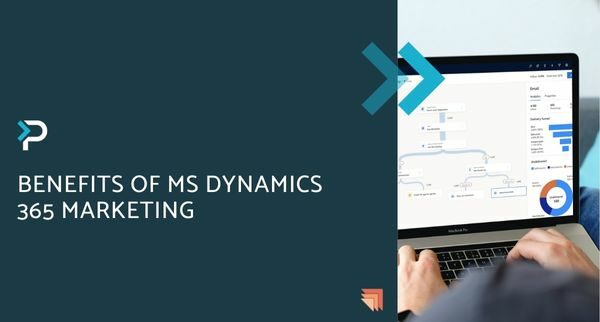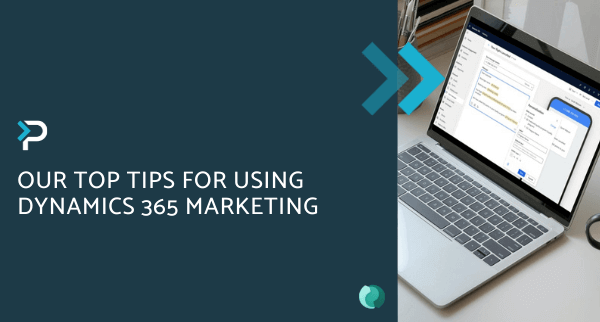What is the difference between real-time and outbound marketing in Dynamics 365?
What is the difference between real-time and outbound marketing in Dynamics 365?
April 13th, 2024
8 min read
In the world of digital marketing, businesses are constantly seeking effective strategies to engage their target audience and drive conversions. Microsoft Dynamics 365 Marketing is a comprehensive marketing tool that makes this a possibility. The solution has a wide range of marketing capabilities that are currently split into two areas: outbound marketing and real-time marketing. However, since real-time was introduced back in 2021 in addition to outbound marketing, users have expressed confusion regarding the differences between the two and which is better to use for certain scenarios. In this blog post, we explore the two areas, aiming to give you a better understanding of the following topics:
- What is outbound marketing in D365 Marketing?
- What features are there in outbound marketing?
- What is real-time marketing in D365 Marketing?
- What features are a part of real-time marketing?
- What is the difference between real-time and outbound marketing in D365?
Update* As of the 1st September 2023, Dynamics 365 Marketing is now redesigned as Dynamics 365 Customer Insights – Journeys, new customers will only be able to access the real-time marketing application, while current customers will be encouraged to switch from their current plan over the next year.
What is real-time marketing?
Real-time marketing is when marketing activities are used to interact with customers within real, or near real time. This approach focuses on providing extremely personalised and targeted interactions, with the hope of increasing engagement and customer loyalty to drive conversions.
The features available within the real-time are geared towards providing marketers with the best possible tools that make timely, personalised interactions easy and effective.
What features are a part of D365 real-time marketing?
Trigger-Based Journeys: Trigger-based journeys, also referred to as event-driven journeys, are marketing campaigns that are activated in response to specific actions performed by customers.
In D365 Marketing, triggers can encompass a wide range of events and are defined based on what an organisation considers valuable, such as website visits, email opens, and product purchases.
Establishing trigger-based journeys enables marketers to easily keep track of where customers are, making it easier to send targeted communications. This enables organisations to foster stronger relationships that last.
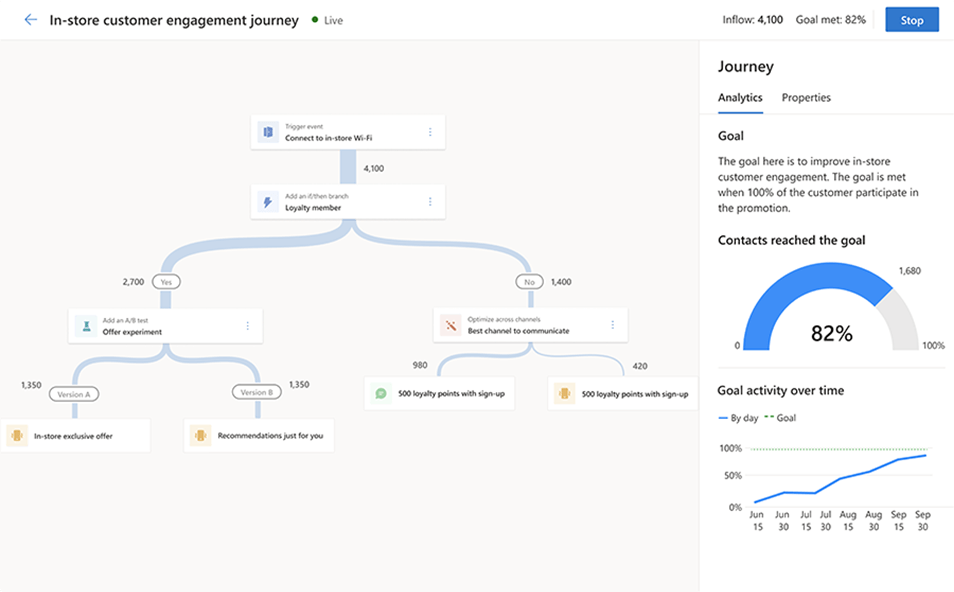
Artificial Intelligence (AI) powered optimisations: It is important that marketing communications are continuously optimised and improved. However, without the right data and tools, this process can be time-consuming and ineffective.
The recent launch of Copilot in Dynamics 365 Customer Insights brings advanced artificial intelligence capabilities to real-time marketing. Marketers can now gain content suggestions and create content at the click of a button making it easier than ever to optimise the customer experience.
Multiple channel integrations: Digital marketing has changed how the marketing landscape works, with consumers now preferring to be contacted through various channels such as social media, email, SMS and more.
Real-time marketing seamlessly integrates with various marketing channels, enabling businesses to deliver consistent marketing across multiple touchpoints. This enhances customers’ experience with the brand and increases engagement.
Real-time analytics and reporting: It is important to understand what marketing activities are driving success and which ones need further improvements. However, without access to up-to-date information, making informed judgements can be difficult.
D365 provides real-time analytics and reporting capabilities, allowing marketers to monitor campaign performance, track customer behaviour, and make data-driven decisions.
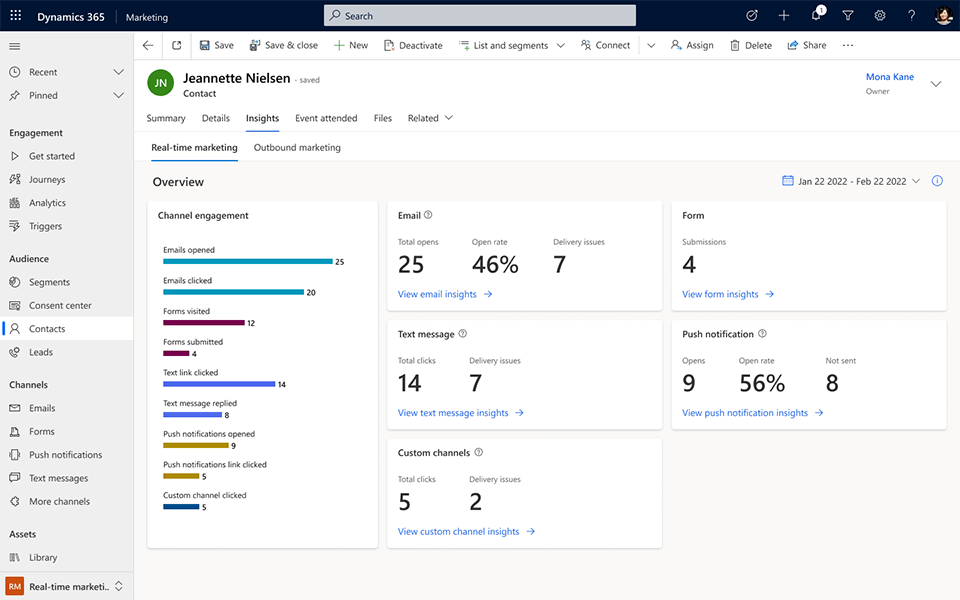
What is outbound marketing in D365 Marketing?
Outbound marketing is the broad term used to describe any marketing activities that are initiated by an organisation first. These interactions can be anything from email marketing to social media posts (and more) and are aimed at driving consumer engagement and conversions.
Keeping this definition in mind, it is easier to understand the purpose of the outbound marketing section in D365 Marketing. Here, features are focused around providing organisations with the best possible tools to plan and execute marketing campaigns that are targeted at a wider audience.
What features are included in outbound marketing?
There are various features included in outbound marketing, some of which are explained below:
Email marketing: Emails are an important part of how organisations communicate with potential customers, and as such having the correct software in place to support with this is crucial.
D365 outbound marketing has advanced email marketing capabilities, that enable users to create, send, automate and analyse marketing emails. This ensures that email communications are timely and efficient, and aims to drive customer engagement.
Segment-based customer journeys: Customer journeys are a series of steps, determined by an organisation that map out the touch points that a potential customer has with the business.
Within outbound marketing, it is possible to utilise segment-based journeys. As the name suggests, these journeys target specific marketing segments that have been established within the solution. If utilised correctly, these journeys can help nurture clients successfully and build strong customer relationships in the process. Within the platform you can utilise either marketing lists or segments to structure the customer journey. To find out the difference between the two and when to use each check out our blog on marketing lists vs marketing segments in Dynamics 365.
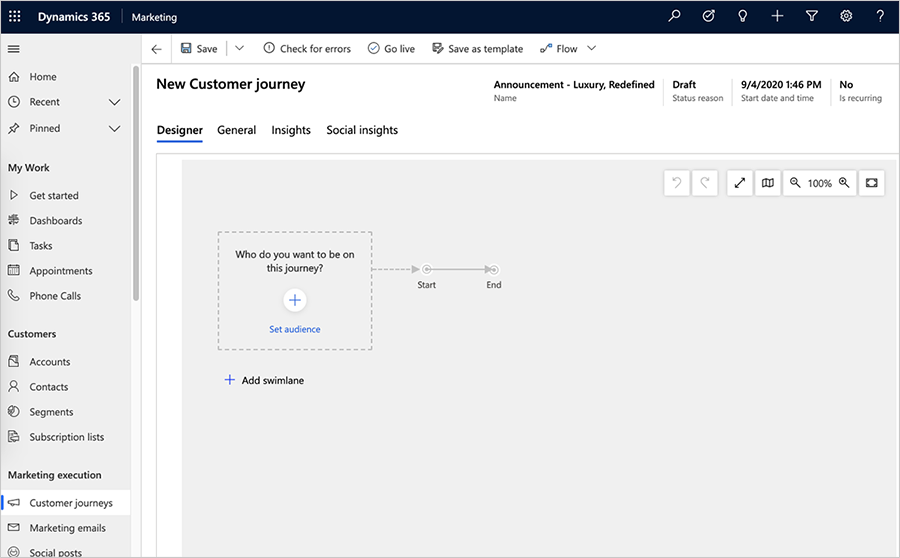
Lead scoring: Nurturing leads can be a complicated process, and it is crucial that resources are allocated effectively.
D365 outbound marketing has advanced lead-scoring capabilities that automatically identify which leads are the best to target, and which ones are at risk. This provides clear guidance for marketers when choosing which leads to pass to sales and where to spend more time developing relationships. Through this lead-scoring feature, organisations can establish an effective and productive management of leads in Dynamics 365 Marketing.
Marketing forms and landing pages: It is important that customers have the option to directly interact with your content, through contact forms and landing pages.
It is easy to embed interactive forms and landing pages within your website, emails, and other areas using outbound marketing. This makes it simple to capture customer information, and any information entered into forms or pages is automatically integrated into your D365 system. This ensures that all customer data is up-to date and that any marketing interactions are as effective as possible.
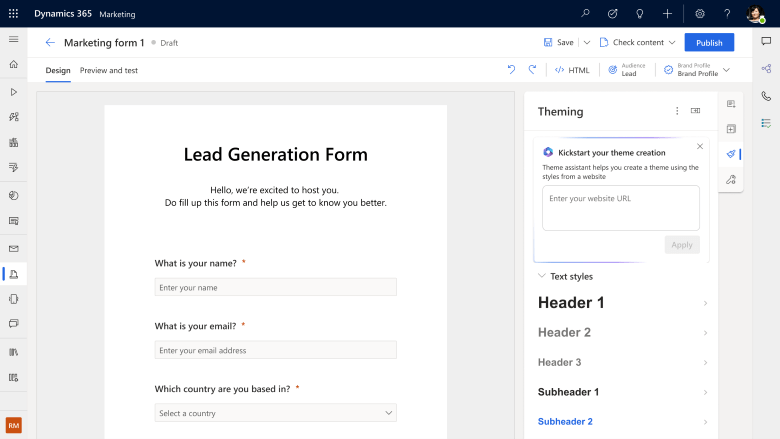
So, what is the difference between real-time and outbound marketing in D365?
From the above explanation, it becomes clear that both outbound and real-time marketing are advanced solutions that can help businesses drive engagement and conversions. However, both sides have different features that better suit organisations, for different needs.
When should I use outbound marketing?
Depending on your organisation, outbound marketing may suit your needs better than real-time marketing. We recommend outbound for the following scenarios:
Best used for…
- …organisations that are proactively trying to reach out to their audience for instance sharing live or virtual events in Dynamics 365 Marketing invites
- … organisations that want to create and successfully deliver large-scale marketing campaigns that target a high volume of contacts
- … organisations that want to manage and identify leads effectively
When should I use real-time marketing?
Real-time marketing has different features available and because of this is better suited to certain scenarios. Please find our recommendations below:
Best used for…
- …organisations that want to engage with customers in real-time based on their actions and behaviours
- … organisations that want to deliver ultra-personalised and targeted marketing interactions across multiple channels
Check out our top tips for using Dynamics 365 Marketing to uncover how you can get the most out of the systems vast capabilities.
A note for the future
Microsoft has announced that in the future it will only continue to invest in real-time marketing, as such it is anticipated that eventually, this will become the main marketing option. However, currently, both real-time marketing and outbound marketing coexist within the Dynamics 365 Marketing application and fulfil different requirements.
Microsoft has provided some additional guidance around the known limitations of real-time marketing at the moment. However, it is suggested that organisations should use real-time marketing unless there is a specific feature within outbound that is required.
Get in Touch
We hope that the above blog has provided in-depth information about the two different areas. If you have any questions about the features discussed or are looking to implement Dynamics 365 Marketing, then please get in touch. You can do so by filling out the contact form, emailing us at info@pragmatiq.co.uk, or calling us on 01908 038110.
Want to keep in touch?
Sign up to our newsletter for regular updates.
"*" indicates required fields
